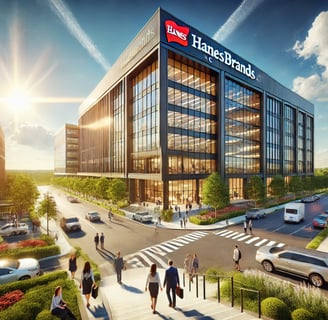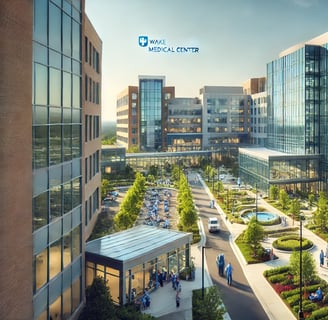Key Industries Driving Winston-Salem’s Economy
Discover the key industries driving Winston-Salem’s economy, from historical tobacco roots to emerging tech and healthcare sectors.
WINSTON-SALEMFORSYTH COUNTYECONOMY
George
8/7/20245 min read


Key Industries Driving Winston-Salem’s Economy
Winston-Salem, North Carolina, boasts a diverse and dynamic economy, shaped by its rich history and evolving industries. From its origins in tobacco and manufacturing to its current status as a hub for healthcare, education, and technology, Winston-Salem continues to adapt and grow. This article explores the key industries that have driven the city's economy and those that are paving the way for its future prosperity.
Key Takeaways
Winston-Salem is more than just a city; it is a hub of historical significance, cultural diversity, economic vitality, and educational excellence. This overview will cover:
Overview of Winston-Salem's main industries.
Historical significance and current economic drivers.
Major employers and their impact on the local economy.
Future trends and potential growth sectors.
Historical Industries
The Tobacco Industry
The tobacco industry has played a crucial role in shaping Winston-Salem’s economy. The R.J. Reynolds Tobacco Company, founded in the late 19th century, became a cornerstone of the local economy, driving growth and development. At its peak, the company employed thousands and helped establish Winston-Salem as a major industrial hub. Over time, the industry evolved, with modern advancements and diversification into new products. Today, while its economic influence has waned, the legacy of the tobacco industry remains an integral part of the city's cultural and historical identity.
Textiles and Furniture Manufacturing
In addition to tobacco, Winston-Salem was historically known for its textiles and furniture manufacturing. Companies like Hanesbrands played significant roles in the local economy, providing jobs and fostering community growth. The peak periods of these industries saw extensive production and export of goods, contributing to Winston-Salem’s reputation as a manufacturing center. As global economic dynamics shifted, these industries modernized, adopting advanced manufacturing techniques and focusing on innovation to remain competitive.
Historical Industries in Winston-Salem


Current Economic Drivers
Healthcare Sector
The healthcare sector is a major economic driver in Winston-Salem. Leading facilities such as Wake Forest Baptist Medical Center and Novant Health are not only significant employers but also centers of medical innovation and research. The sector provides a wide range of jobs, from medical practitioners to administrative staff, and continues to expand with investments in biotechnology and medical research. The presence of these institutions has made Winston-Salem a regional healthcare hub, attracting talent and fostering economic growth.
Education and Research
Education is another pillar of Winston-Salem's economy. Institutions like Wake Forest University, Winston-Salem State University (WSSU), and the University of North Carolina School of the Arts (UNCSA) are critical to the city's economic and cultural fabric. These universities contribute significantly to the local workforce, support research initiatives, and drive innovation through partnerships with industry. The educational sector not only provides direct employment but also helps cultivate a skilled workforce that supports various other industries.
Economic and Educational Landscape in Winston-Salem


Financial Services
Winston-Salem is home to several major financial institutions, including BB&T (now Truist Financial). The expansion of banking and fintech companies in the area has created numerous jobs and added to the city's economic diversity. These institutions play a crucial role in the local economy by offering financial services, supporting businesses, and driving economic development through investment and innovation.
Emerging and Future Industries
Technology and Innovation
The rise of technology and innovation hubs, such as the Wake Forest Innovation Quarter, marks a significant shift in Winston-Salem's economic landscape. This district is a hotbed for tech startups and research initiatives, focusing on IT, biotech, and advanced manufacturing. Supported by local government and educational institutions, these innovation hubs are crucial for driving future economic growth and attracting new businesses to the area.
Advanced Manufacturing
Advanced manufacturing continues to be a vital part of Winston-Salem's economy. Key players like Hanesbrands and Krispy Kreme have embraced automation and cutting-edge techniques to stay competitive. This sector not only provides employment but also ensures economic stability by maintaining a diverse industrial base.
Economic and Educational Landscape in Winston-Salem


Tourism and Hospitality
Tourism and hospitality are burgeoning sectors in Winston-Salem, driven by the city’s rich cultural heritage and vibrant events calendar. Growth in tourism, cultural attractions, and events like festivals and conventions significantly boosts the local economy. The development of hospitality infrastructure, including hotels and restaurants, supports this growth and enhances the city's appeal as a tourist destination.


Economic Outlook and Development
Real Estate and Construction
The real estate and construction sectors are experiencing steady growth in Winston-Salem. Current trends indicate increased development in both commercial and residential areas, driven by economic expansion and population growth. Major projects, such as new business parks and housing developments, are expected to have a significant economic impact, contributing to the city's overall prosperity.
Small Business and Entrepreneurship
Small businesses and entrepreneurship are vital components of Winston-Salem's economy. Support systems like the Small Business Center at Forsyth Tech and local chambers of commerce provide resources and guidance for startups and entrepreneurs. Success stories from notable startups highlight the city's conducive environment for business growth. Government initiatives and incentives further bolster this sector, ensuring continued economic vitality.
Living in Winston-Salem
Infrastructure and Transportation
Efficient infrastructure and transportation networks are crucial for economic growth. Winston-Salem benefits from well-developed highways, airports, and public transit systems, which enhance connectivity and support commerce. Ongoing infrastructure improvements are expected to further boost economic development and improve quality of life for residents.




This comprehensive overview of the key industries driving Winston-Salem’s economy highlights the city’s historical roots, current economic drivers, and future growth prospects. Understanding these elements provides valuable insights into the economic landscape of Winston-Salem, showcasing its dynamic and evolving nature.


